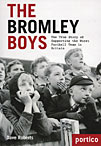 The True Story of Supporting the Worst Football Team in Britain
The True Story of Supporting the Worst Football Team in Britain
by Dave Roberts
Portico, £12.99
Reviewed by John Carter
From WSC 259 September 2008
Male adolescence is – among other things too toe-curling to be discussed in public – about making grown-up choices. It’s the first time we make our mark, take a stand, pledge an allegiance. The Bromley Boys is about one such choice.
It’s 1969 and Dave Roberts has supported his local club, Bromley, for three years. He doesn’t know it yet but they’re about to embark on their worst season in history. In this book Roberts channels his inner 14-year-old and relives that year, heartbreak by heartbreak. The anorak-wearing, junior statto-keeper is a cross between Adrian Mole and Just William. Fervently loyal – he buys Space Oddity only because Bromley is David Bowie’s home town – young Dave carries his boots to every match in case the team are a man short. He always purchases two programmes: one to write in, one to save (which came in handy 40 years later) and thinks nothing of hitchhiking for three hours on a November evening to watch a 0-0 at Grays.
Lumpish, with no close friends, Roberts notices his more popular schoolmates follow big clubs such as Arsenal or nearby Crystal Palace, but Bromley attract misfits like himself. There’s Derek, “about 5’5”… he was the one we all looked up to”. Roy “a wild-haired dustman with the thickest glasses I had ever seen and firm (but misguided) opinions on everything”. Finally Peter, who “hardly ever spoke and no one knew what he did for a living. The only available information was that he lived with his mother in a small bungalow. Maybe that was all we needed to know…” Roberts is in awe of this trio and lives for the day he’s invited to join them in the club shop to sell enamel badges and old programmes. Meanwhile on the terrace he joins The Grubby, a morose hippie who begins every match with two cups of tea (four sugars each) and a packet of Players No 6.
Despair follows each defeat, but collective optimism remains unquenchable. After losing 21 of 22 matches, Bromley pull off a surprise FA Amateur Cup win: “Every season has a turning point. This looked like being ours. The early exits from the FA Cup, Kent Floodlit Cup and Kent Senior Cup, as well as having no chance of winning the league, had actually worked in our favour. Bromley were now free to concentrate on winning the Amateur Cup.” Sadly it was not to be.
Along with an obsession for detail (want to know the Christmas 1969 Top of the Pops line-up?), Robert’s wry, self-deprecating style is his book’s biggest asset. Football fan or not, it’s a genuinely funny read. However, if you ever followed non-League football as a youngster, or endured a season like Bromley’s, you’ll recognise the tears hidden behind the smiles.
On the negative side there’s occasional, and unnecessary, exaggeration. Bad as they were, Bromley were never “the worst football team in Britain” as the cover states. Nor was the Isthmian League of as low a standard as Roberts sometimes implies. These are minor caveats, though. The Bromley Boys is a light-hearted lead-in to the serious business of a new season, and thoroughly recommended.